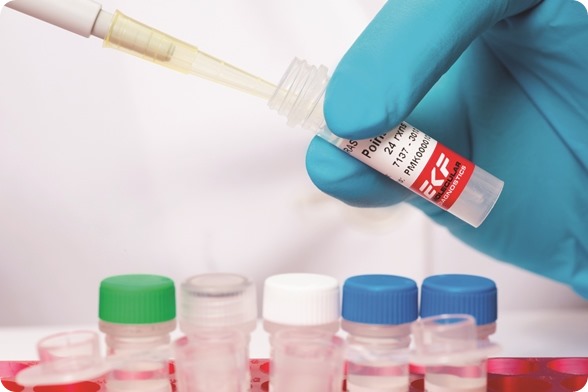EKF Diagnostics, the global diagnostics company, announces that it has entered into a two year research collaboration with Massachusetts General Hospital (MGH), a global leader in successfully bridging innovative science with state-of-the-art clinical medicine, to develop PointMan™ assays that can effectively detect treatable cancer mutations in blood samples.
The collaboration agreement has been signed following a detailed evaluation of PointMan DNA enrichment technology by MGH and will cover a two year long project focussing on lung, breast and skin cancer.

Image credit: EKF Diagnostics
MGH will use PointMan DNA enrichment technology for the detection of genetic variation in circulating tumour cells (CTCs) isolated from a patient’s blood using MGH’s CTC-Chip instrument. CTCs are shed by primary tumors allowing the cancer to metastasise. CTCs are extremely rare in whole blood and their isolation and characterisation could offer clinicians a routine method with which to diagnose, treat and monitor the progress of various cancers. The main difficulty in successfully analysing CTCs has been the ability to detect low level mutations sufficiently and to create assays that are sensitive enough to provide meaningful data; difficulties which PointMan may be able to effectively overcome.
EKF Molecular will design and develop high sensitivity assays which will be utilised by MGH with a view to clinically validating PointMan in the detection of existing and novel mutations, a major step towards the improvement of patient outcomes in the hospital.
Andrew Webb, CEO of EKF Molecular Diagnostics Ltd, commented:
The results of an initial assessment, and now this two year collaboration, moves us even closer to the routine use of blood based tests for cancer rather than a tissue biopsy. The combination of MGH’s CTC-Chip instrument and the easy to use and quick to perform PointMan technology should make this approach to cancer detection and monitoring available, ultimately, to the majority of molecular testing laboratories.
Dr Daniel A. Haber, Director at Massachusetts General Hospital Cancer Center and Kurt J. Isselbacher, Peter D. Schwartz Professor of Oncology, Harvard Medical School, commented:
We have been studying the sensitivity of DNA enrichment technology as a way to detect and monitor specific mutations in cancers from patients utilising circulating tumour cells isolated from a simple blood sample. I am hopeful that the combination of such technology with our CTC-Chip technology will have the potential to improve the clinical management of our patients.”
Dr Shyamala Maheswaran, of the Massachusetts General Hospital Cancer Center and Associate Professor of Oncology at Harvard Medical School, who was principal investigator for the collaboration, commented:
This study demonstrated incredible sensitivity for mutations that are relevant to lung cancer, breast cancer and melanoma. During the course of the two-year research collaboration, we will look for other potential target genes associated with these and other cancer types.
The initial proof of concept data produced by Dr Shyamala Maheswaran’s research team at MGH using PointMan DNA Enrichment assays to detect EGFR sensitizing, as well as resistance (T790M), mutations associated with lung cancer and BRAF V600E associated with melanoma have proved enlightening. These experiments involved spiking as few as 3-10 tumour cells harbouring the appropriate mutations into white blood cells. PointMan enrichment assays reliably detected both T790M and V600E at a frequency of 10 mutant alleles (gene copies) in a background of 10,000 wild type (normal) alleles. Ongoing pilot studies have suggested an even more robust detection sensitivity of three mutant alleles in a background of 30,000 wild-type alleles.
For more information on EKF Diagnostics, please visit www.ekfdiagnostics.com.